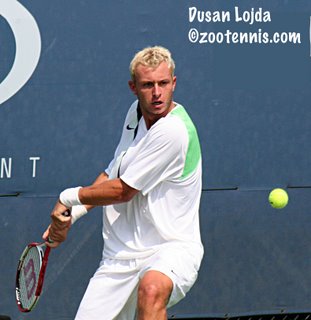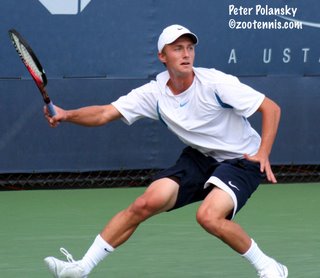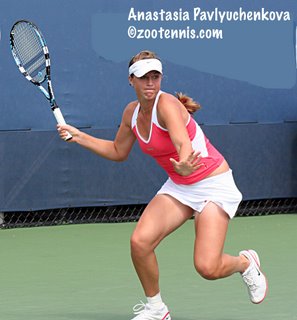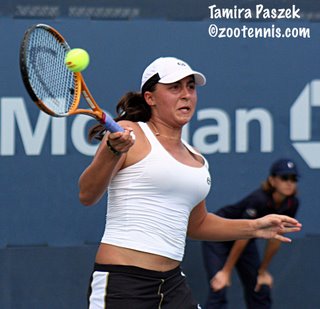Pavlyuchenkova Bookends 2006 with Grand Slam Singles Titles; Lojda Becomes first Czech Boys Champion

©Colette Lewis 2006
Flushing Meadows--
First I'd like to welcome all the fans of Peter Bodo's "wildly popular" (quoting espn.com's Greg Garber) TennisWorld blog to zootennis. Peter is sitting two desks away from me, and offered to throw readers interested in the juniors my way and suggested that I welcome them. What Peter, steggy and company suggest, I do. So welcome, and come back often. I do daily updates on junior and college tennis, and my next trip is the Intercollegiate Tennis Association All-American in Tulsa next month. But I'll need a couple of weeks to decompress from this, which was one crazy day.
One thing I can't assume, that Peter can, is that any of my readers know who won, or what the score was. So let's get that out of the way. Anastasia Pavlyuchenkova defeated Tamira Paszek 3-6, 6-4, 7-5 to win the girls championship. Dusan Lojda beat Peter Polansky 7-6 (4), 6-3.
I was working for The Tennis Channel Sunday as a research assistant for their tape-delayed coverage of the junior finals, so I viewed the boys final from the TV production booth high above court 11.
Although Donald Young didn't make the final, TTC still had a great story for its English-speaking audience, with the return to top-level tennis of 18-year-old Canadian Peter Polansky, who had a horrific sleepwalking accident in Mexico City in April, kicking out a third story hotel room window in an attempt to flee an imaginary intruder. The fact that he fell on a small bush probably saved his life, but it didn't keep him from cuts on his legs that required 400 stitches, and a week in a Mexican hospital before he returned to Canada.
In a wheelchair for five weeks, Polansky began to play full tilt just a couple of months ago, but his last two weeks of tennis have demonstrated just how far he's come. He defeated the number one seed and 2006 French Open boys champion Martin Klizan in the second round and on Saturday took out Young, the world's no. 1 junior in 2005, seeded fourth in New York.
"Before my accident I was playing really well, I had made like two quarterfinals of two Futures," Polansky said. "I was in Davis Cup (as an alternate), hitting with the guys. After my accident, when I stepped on the court three months later, it's like I didn't really skip a beat. It's just been going really well."
But the cumulative result of two weeks of the daily matches demanded of junior tennis players, a total of 12 matches in a two week stretch, took its toll. Because his ITF ranking was 69, Polansky wasn't assured a spot in the main draw. But two spots, "special exemptions" are reserved for players who are in at least the semis of the previous event and are unable to make the qualifying, and when he reached the finals in the Canadian Open, which finished on September 2nd, he secured a main draw berth.
His opponent in the final, eighteen-year-old lefthander Dusan Lojda, the top junior in the Czech Republic, didn't drop a set in the tournament, dominating in every match. Seeded tenth due to his ATP ranking of 598, a string of upsets kept Lojda from playing a seed until Saturday's semifinal, and against no. 9 Luka Belic of Croatia, it was again no contest.
Lojda played the Australian Open juniors, but didn't go beyond the round of 16. Deciding that Futures tournaments would better prepare him for the next level of tennis, he played in such places as Tunisia, Israel and Croatia.
"I won one, and was in one final and just a few quarterfinals," Lojda said. "When you already play Futures, you are playing the men's tennis. Now in juniors you are little bit up than who is playing junior."
Polansky, who received a wild card into the recent Master Series Rogers Cup in Toronto, where he lost in the first round to ATP no. 97 Frank Dancevic, also of Canada, has also been playing the pro game since his return.
"You see them play and they make it look so easy," Polansky said of the pros he hit with following his loss in the Rogers Cup. "But when you go up there, their balls are a lot heavier, and it's tougher. But I was able to be in there with those guys, that's what mainly gave me a lot of confidence."
When Polansky took a 3-1 lead in the first set tiebreak, it looked as if he might manage to take the set even with more unforced errors and less effective serving than he'd show all week. But Polansky was broken on both his serving points leading 4-3, the second on a wild backhand, and Lojda was one set away.
Lojda bashed two aces to open the second set and when Polansky was broken in his first service game, it looked bleak for the Canadian. But even serving at 1-4, 15-40, Polansky kept jogging at the baseline, and gave Lojda no indications of surrender. When Polansky won that game--"if I went down two breaks, I knew it would be really tough," and he kept hoping, "but I couldn't get that break in the second."
When he stepped to the line to serve it out, Lojda didn't have it easy. A backhand volley winner by Polansky evened the game at 30 but a first serve deep in the box and a forehand winner gave the Czech Republic its first junior US Open champion.
For Lojda, it wasn't his strokes that made the difference. "Because forehand, backhand, everybody's playing good....you have to have concentration for the important points. It's 30-all, what to play?
(It's) just in the head, I think."
For the girls champion, it isn't about winning. Her mantra, the same one that she began the year with in Australia, when at 14, she won her first junior Slam title, is: "I just want to show my good game."
Since the boys and girls singles were played at the same time, I didn't see much of the girls final, but after their French Open Juniors quarterfinal match went to 6-4 in the third, a long tough battle was a good bet. A huge crowd overwhelmed the meager bleachers on Court 10, and both girls had vocal supporters, cheering every winner or error.
Dropping the first set, as she did in Paris, Pavlyuchenkova was determined to fight back.
"I was up like 2-0, so I was upset that I couldn't win that first set. But then I said it's like a final, the last match, so I can't just play bad and give her this match. So I try to keep fighting, play every point. It was so difficult. She played great tennis."
Austrian Paszek, playing in her third U.S. Open junior championship at age 15, hung in until 5-5 in the third set, and even when she dropped her serve, to give Pavlyuchenkova an opportunity to serve it out, the match was still anyone's.
At 15-30, Pavlyuchenkova hit a forehand crosscourt that appeared to be out, but was called good by the line judge, saving her from facing two break points. She made an error to give Paszek a break point for a third set tiebreak, but Pavlyuchenkova crushed a forehand winner to save it. A Paszek error gave the Russian a match point, and one swinging forehand volley later, she had collected her second Grand Slam singles title.
Unlike Australia, where only her coach and brother Sasha was present, this time Pavlyuchenkova celebrated with her entire family.
"It's really great that my family is here and saw I won this title. Just by phone you cannot explain your emotions..I'm really happy that I could make the present for them."
Next on Pavlyuchenkova's agenda is playing Junior Fed Cup for Russia in Barcelona later this month. Currently not represented by any sports management agency, it is the Russian Federation and her brother that set her schedule, but as of now, she hopes to play the Kremlin Cup and a mixture of professional and junior events.
Asked where she saw herself in five years, she looked up at the TV broadcast of the Roddick-Federer match, pointed and said, "there."
Arthur Ashe Stadium may hold another Russian women's champion soon.
For more coverage of the U.S. Open Juniors, see Marcia Frost's site collegeandjuniortennis.com.









1 comments:
For the first time in many years I missed the boys final. The last time I missed was Federer and nalbandian but I have your excellent report to keep me au courant. I also sat through the whole Polansky-Young match. The scars from the accident make you wonder how he survived but as one who frequently travels to Mexico medical care is excellent (if you can pay for it). I thought Young's high bouncing shots tested Polansky's patience in the second set but he came through in the third. This is a time for the Young family to stop and think. Donald has not grown an inch since i first saw him and he still shows his frustration too clearly on the court. To my mind too much rides on those slender shoulders. Thank you for the coverage Colette and I mention you on Tennis Week as the absolute authority.
Post a Comment